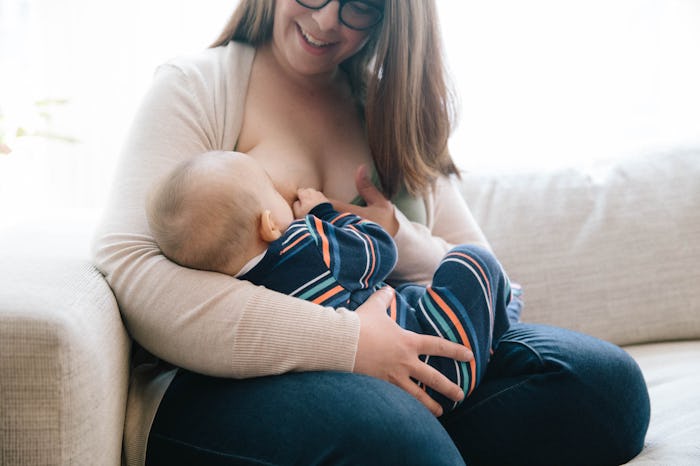Life
How Your Breastfeeding Body Works To Make Sure You Don't Get Dehydrated Is *So* Cool
It's true that pregnancy cravings are no joke, but I have to be honest: It was breastfeeding cravings that really gave me a run for it. I was every level of hungry that you might imagine and found myself slathering peanut butter between gluten-free graham crackers and chugging orange juice. Quite the combo, eh? Turns out I'm not alone — a lot of women report needing all of the food and fluids while breastfeeding. But how do you know if you're giving your body what it needs? Here's what happens if you don't drink enough water while breastfeeding, according to experts.
"The human body is very cool. When a person is lactating, they will get a signal to quench their thirst before a non-lactating person does. The body needs to be hydrated to feel good and to make milk," Leigh Anne O’Connor, an International Board Certified Lactation Consultant (IBCLC) and parenting coach, tells Romper in an email interview. "The body will prioritize making milk so the mom will feel thirsty, in most cases, before it has a negative impact on milk production. However, in some cases, the milk supply can be compromised if the mom is dehydrated."
According to the website for Dr. Sears, the average 6-month-old consumes around one quart of breast milk daily and 90 percent of that milk is water, so that means a mom should drink about four extra 8-ounce glasses of fluid daily.
But take care not to force fluids, noted Kelly Mom. Drinking to "satisfy thirst is sufficient for most mothers to stay hydrated," the website noted. "Pay attention to your body’s signals — busy mothers often ignore thirst if there is nothing nearby to drink — try to keep a drink near where you usually breastfeed baby or at your desk at work." Darker colored urine, dizziness, weakness, fatigue, headaches, urinating less often, constipation, thirst, and dry mouth are all signs you might not be getting enough water.
Similar to Kelly Mom, The Bump noted that the amount of water you need will vary from other moms' requirements, and it will also change day-to-day. For example, you'll probably chug more H2O on a hot day or after getting your sweat on at the gym. "One way to tell if you’re adequately hydrated: check your pee," the website noted. "If your urine is pale yellow, you’re taking in enough fluids. If it’s darker, drink some extra fluid."
Have trouble staying on top of your fluids consumption? Mother Rising offers a few tips, including pre-filling water glasses or bottles in the morning, and then lining them up on the counter (or packing them for work) to grab while you're on the move. You can also try the trick where you wrap rubber bands around a mason jar or glass, each band representing a glass of water. Each time you finish one, you remove a rubber band with the end goal being no rubber bands by the end of the day. There are also a number of hydration apps that you can download for free.
Breastfeeding and staying hydrated can prove difficult at times, but it's another reminder of why self-care is so important for mamas, especially during those early days of new motherhood. Plus, you'll be ready to take on late-night feedings and multiple diaper explosions when you do so.
As for the feed-me-now cravings, I say give in to what your body is asking for. I haven't eaten that combo since the first few months of my daughter's life, but, man, it was a lifesaver at the time.
Check out Romper's new video series, Bearing The Motherload, where disagreeing parents from different sides of an issue sit down with a mediator and talk about how to support (and not judge) each other’s parenting perspectives. New episodes air Mondays on Facebook.
